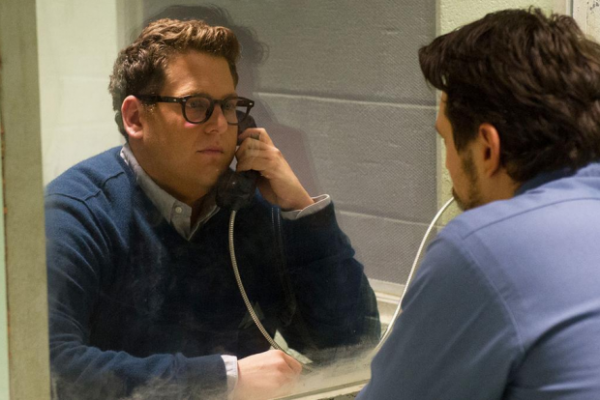The true story behind True Story has the two requirements of a great “True Crime” narrative. The crime must be brutal. The circumstances must be bizarre. Rupert Goold’s movie offers up the added bonus of weaving in a theme regarding guilt—not just criminal guilt, but personal guilt as well. However, the movie is so eager to hold your hand and make sure you’re always are of how its two main characters relate to each other that it drains the picture of any subtlety. It’s a handsomely shot picture and the strong performances from leads Jonah Hill and James Franco keep the movie entertaining, but there should be so much more to this story.
Hot-shot New York Times writer Mike Finkel (Hill) has lost his job after admitting to bending the truth on an article because it would have suited a better, more compelling narrative. Meanwhile, Christian Longo (Franco) is a fugitive who decides to use Mike’s name and profession as a cover before being apprehended in Mexico. In the middle of Finkel’s fruitless job search, he learns of Longo’s actions and goes to interview him in prison. Finkel believes he has enough material for a book because he was “chosen,” and Longo says he’s didn’t commit the horrendous crime of murdering his wife and three young children. As Finkel gets sucked in further by Longo’s story, the two men develop an odd kinship as they seek absolve their own guilt.
In college, a friend and I were taking an intro to filmmaking class. One of the student films was a laughably exploitative short about a young girl visiting New York City, and she’s abducted. The teddy bear she was carrying is left on the sidewalk; it lies on the ground, an overbearing symbol about the loss of innocence. From then on, my friend and I have occasionally employed the phrase, “about as subtle as a teddy bear.”
True Story literally begins with a teddy bear slowing dropping into a suitcase that holds the body of one of Longo’s murdered children. Later, in case you still didn’t get what the movie is trying to convey in that opening shot, Finkel says, “It’s almost like the teddy bear died when she died.”
Heavy-handed symbolism is rarely honest because it’s trying so hard to guide the audience to a specific idea. In this way, Goold shares both Finkel and Longo’s desire to tell an exciting story, but not necessarily a true one. Both men are liars in their own way as Longo flatters Finkel and Finkel flatters his own ego by believing Longo would never lie to him. “Everyone deserves to have their story heard,” Finkel says to his skeptical wife, Jill (Felicity Jones, whose only job in the film is to look concerned). Clearly, Finkel believes that if Longo is innocent, then it will also provide a kind of redemption—they both told the truth, and the truth set them free.
There’s a potent duality between lies and truth, its all undermined by the total lack of nuance. There are moments in the early conversations between Finkel and Longo where the word “FORESHADOWING” may as well start flashing across the screen. When Finkel is helping Longo with his personal writing, he points out a double negative, and Longo responds, “Two negatives don’t make a positive.” Gosh, do you think the negative behavior of both men in this humorless picture might mean that they’re misleading each other through lies and half-truths.
The overbearing themes and messages are thankfully somewhat mitigated by Hill and Franco. Although they may seem like an odd pairing at first since they previous co-starred in the comedy This Is the End, they have a strong dramatic rapport. While Franco has done more dramas and acquits himself well here, Hill is perfectly cast as Finkel. He has the confidence to convey the character’s cockiness, but also an everyman quality that makes us believe the character would not only seek adulation, but also be arrogant enough to think he’s the major beneficiary of his relationship with Longo. There’s more texture to Finkel as Hill shows us how the character is willfully attempting to ignore the darker aspects of his project like attempting to make a comeback by profiting on a horrific crime.
The compelling truths inside True Story are worth considering, but strong storytelling involves effectively conveying the truth. The more the audience has to work to uncover those truths, the more powerful they become. Working to learn something is better than receiving the answers without any effort. We don’t need to dig through the lies to uncover a deeper truth. Goold has already brought all of it to the surface.
Rating: C+
Click here for all of our Sundance 2015 coverage. Click on the links below for our other reviews:
Matt’s Reviews:
- The Bronze
- The End of the Tour
- Going Clear
- In Football We Trust
- The Mask You Live In
- Mississippi Grind
- Most Likely to Succeed
- Slow West
- Stockholm, Pennsylvania
- White God
- Z for Zachariah
Adam’s Reviews



